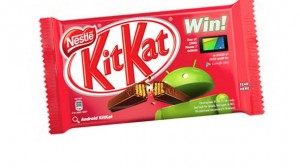Google’s Android 4.4 release thought to be just around the corner.
Unlike Google’s upcoming Nexus 5 smartphone, there’s a relative vacuum of information about what to expect from the next Android OS, named KitKat, beside a global cross-promotion campaign with Nestle.

1. The Nestle tie-up
Since Nestle’s KitKat has the honour of giving its name to Android’s next OS, expect free-flowing puns from the company, which is planning to give away a bunch of Google’s Nexus 7 tablets — which were among the first devices to ship with Jelly Bean Android 4.3. It’s not clear whether the Nestle giveaway devices will ship with KitKat on board, though presumably they will, given the marketing tie-up. Despite Google having notched up one billion Android activations to date, the partnership with Google on Android is meant to make it more mainstream than it already is. (Although we’d argue an OS that powers four in five of the world’s smartphones is pretty mainstream to begin with.)
2. It’s not Key Lime Pie
Given the Nestle partnership is all about making the Android brand more mainstream, it’s perhaps no surprise Google didn’t go with Key Lime Pie — its original choice for the name of the next Android OS — as the dessert isn’t widely known outside the US.
Google’s Android chief Sundar Pichai earlier this month announced the forthcoming release of Android 4.4 illustrated by an image of giant Android KitKat, signalling it would be KitKat, not Key Lime Pie, that would be the successor to Jelly Bean. These OS codenames followed Cupcake, Donut, Eclair, Froyo, Gingerbread, and Honeycomb. It is the first time a brand besides an OEM has partnered on a Google OS launch.

3. An October release date
No one but Google (and possibly Nestle’s marketing team) knows exactly when KitKat will be released, but current bets are on October. To that end, punters recently got a plausible confirmation via Nestle Germany’s KitKat Facebook wall, in which the company indicated the OS will be released later this month.
4. The Nexus 5
It’s thought the Nexus 5 will be the first device to come bearing KitKat — a logical pattern given the Nexus 4 was the first smartphone to hit the market with Jelly Bean. The heavily-leaked Nexus 5 from LG is thought to be due for release before the end of the month. Rumours also have the Nexus 5 coming with 32GB on board storage, and offering LTE support. Hopefully this time Google and LG have ironed out supply chain constraints that fans had to deal with in 2012 with the launch of the Nexus 4.
5. KitKat: an evolution not a revolution
Though there haven’t been too many leaks about the new OS, but a recent one has shed light on a few features that may arrive in KitKat.
Gadget Helpline last week published details and pics of what it believed was an unfinished version of KitKat that still had the markings of its original name, Key Lime Pie. According to its review, Kit Kat is not a complete overhaul of Jelly Bean, but it was more polished, smoother and faster.
Jelly Bean brought features like dial pad autocomplete for phone numbers and names, improved tap-typing recognition, battery-saving wi-fi location options, Bluetooth Smart support, improved graphics, and restricted profiles for different apps.
Google’s latest distribution figures show around half of Android device owners are on Jelly Bean, with relatively few on just 1.5 percent of the world’s Android devices run Jelly Bean 4.3, while around 47 percent use 4.1 or 4.2.
6. New inbuilt features for payments and printing
Two new features that could be on the way in 4.4, according to Gadget Helpline’s leaks, include a native printing option for Android devices and a payment feature that hints at built-in NFC payments (rather than via third-party apps).
KitKat could also include a Miracast-based feature for wireless video output to TVs and may bring a few minor changes to the dialler pad, such as a white notifications instead of blue ones.
Also, users could expect inbuilt photo editing options, such as Tilt-Shift and Center Focus, plus Negative and Posterize effects. There could also be formatting and colour controls for printing to networked printers.
7. Bundled productivity apps
Notably, beyond Google’s core apps, the leaks suggest Google’s productivity apps, such as Keep, Drive and QuickOffice (a Microsoft Office compatible product which it recently made free on Android and iOS) will all have a prominent place in the OS.
Source: ZDNet

